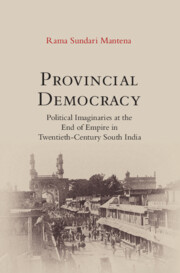Book contents
- Frontmatter
- Contents
- List of Figures
- Acknowledgements
- List of Abbreviations
- Map
- Introduction: Self-Determination, Federation, and Civil Liberties in Twentieth-Century South India
- 1 Liberalism and Anti-Colonialism in South India
- Part I Federation
- Part II Civil Liberties
- Conclusion: After Empire—Language and Regionalism
- Bibliography
- Index
Conclusion: After Empire—Language and Regionalism
Published online by Cambridge University Press: 30 April 2023
- Frontmatter
- Contents
- List of Figures
- Acknowledgements
- List of Abbreviations
- Map
- Introduction: Self-Determination, Federation, and Civil Liberties in Twentieth-Century South India
- 1 Liberalism and Anti-Colonialism in South India
- Part I Federation
- Part II Civil Liberties
- Conclusion: After Empire—Language and Regionalism
- Bibliography
- Index
Summary
From debates over federation to the place of civil liberties in discourses of democratic reforms in colonial south India, the different chapters in this book have brought into conversation social and political histories of princely Hyderabad with those of the British Indian province of the Madras Presidency—histories that have previously been examined separately. The aim of the book has been to illustrate a dynamic and interconnected history of anti-colonial politics in twentieth-century south India that shaped not only the directly ruled provinces of British India but also the indirectly ruled territories. By using the example of princely Hyderabad to investigate parallel political and cultural developments, the chapters aimed to unravel the Hyderabad state's cross-border connections with neighbouring British Indian provinces—in particular the Telugu-speaking districts that a large part of Hyderabad's people shared linguistic and cultural ties with. In other words, what I have argued is that the rise of liberal politics and the subsequent social and political movements not only shaped British Indian political imaginaries but also those of princely Hyderabad. The dynamism of civil societal institutions in the Telugu-speaking districts across this differentiated political landscape gave rise to two important trends: (a) politics based on language and community and (b) the proliferation of political ideologies stemming from liberalism to radicalism that complicated independence from colonial rule in 1947–1948 and the making of the modern Indian nation state. With these two processes of political diversification and the rise of language politics, earlier discourses of self-determination from the interwar period (that dominated both princely India and British India) culminated in linguistic regionalism in the late 1940s and into the 1950s, when the Indian Union took up the task of the reorganization of states based on language.
Each chapter of the book shifted between an analysis of the political conditions of the Hyderabad state and the Telugu-speaking districts of the Madras Presidency to reveal how the political and cultural movements that shaped the region's political imaginaries ultimately culminated in the break-up of the Hyderabad state, making way for the consolidation of the newly independent Indian nation state. While the Nizam's administration took part in federation debates in the 1930s to argue for greater autonomy and the regaining of sovereignty after empire, the discourse of self-determination in British India gave impetus for regional groups to demand provincial autonomy all the while supporting a strong federal centre for the emerging nation state.
- Type
- Chapter
- Information
- Provincial DemocracyPolitical Imaginaries at the End of Empire in Twentieth-Century South India, pp. 204 - 219Publisher: Cambridge University PressPrint publication year: 2023



